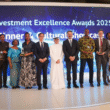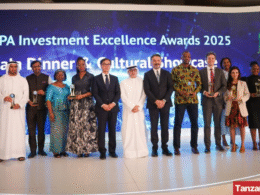TanzaniaInvest interviewed DR Bohelo Lunogelo, Acting Director of Tanzania Economic and Social Research Foundation (ESRF) and he shared insightful details on Tanzania’s economy, investing in Tanzania and the various developments in Tanzania’s growing sectors from the perspective of a think-tank.
TanzaniaInvest.com : TanzaniaInvest.com : What was the view when creating the Tanzania Economic and Social Research Foundation? What have been your greatest achievements since establishment in 1994?
Dr. Bohela Lunogelo : ESRF was created with a view of basically informing the government and also other sectors. They need advice on what policies to pursue, how to implement those policies, to follow up on and gain feedback on these policies. With the private sector, initial challenges were trying to raise awareness amongst local and international stakeholders of the business opportunities in Tanzania.
Although we have not done much in terms of building capacity, previously it was the Tanzanian Government that was doing everything. Now we are shifting toward the private sector being the engine of growth. As an institution we have created policies that shape the conduct of Government, Private Sector and Civil Society. We have been therefore, that we are the first Think-Tank in Tanzania to be created.
We have been involved in designing most of the sector policies you see. I think one of the areas I could say with hindsight we could have done better were the focus areas for attracting Foreign Direct Investment in Tanzania. At that time we were too focused on the mining sector, which was needed, but if you now look at the model and how revenue is shared, we could have been less focused on this.
In terms of jobs. If we had directed more focus on Agriculture for example, the multiplier effect is so huge. Now interest and investment in Agriculture in Tanzania is renewed and revived.
TI : Good economic growth will spill over in terms of taxation from the corporates but eventually with no spillover on the social economic framework. In your experience how can FDI transform something concrete for most of the population in Tanzania?
Dr.B.L : I think it is Mining, per say, that could make it happen. I think it is important to polish the initial contract. Globally, the scenario was based on good practice, you can’t exceed 80% and so forth. So Tanzania has the reserves but it needs to be developed at a reasonable pace. I think it is important to encourage local participation in processing. Also to ensure as companies come to Tanzania there could be local shareholders with them, to avoid a company coming in and leaving very little to the economy.
I think International Capital is also changing the way it looks at things. It is more progressive in thinking unlike the old Capitalist. They are aware they also have some responsibility to make sure we move as one. The globe is one village. So I am happy that this philosophy is the realized philosophy of the new leadership of the G8 and G20. It does not help the prosperity of one or two countries in the world, while the rest of the world is suffering. Interventions in Tanzania’s rural regions are will really benefit people.
The most immediate sector is Agriculture. The good thing about Agriculture in Tanzania is that it not only benefits the local economy but also contributes to the wealth of the world in terms of generation of food. It contributes greatly to Asian markets. The other sector that is important is Tourism. Tourism also indirectly and directly contributes to Tanzania Agriculture industry. When tourist come in their thousands, they eat and buy local foods. So the hotel Industry has the common vision of using local products.
The value of domestic trade is that it sends the right signals. Thus the quality and consistency must be maintained. If the local economy cannot do it, then off course it will be imported. So Tourism is a trigger for other markets. Also, In East Africa there are increasingly more middle-income earners and they generally demand quality products. Higher quality requires better management, farming and better services.
TI : Please highlight the investment opportunities in Tanzania in which foreign Capital can come , which farming product has the highest potential here?
Dr. B.L : Traditionally, if you are targeting the international market, it has always been coffee, tea, cashew nut, oil, and sunflower. Now there are also other demands such as grain, rice and wheat. There are International Companies that have invested in those. So there are several investment opportunities in Tanzania; Tourism, Agriculture, Natural Resources and Infrastructure.{xtypo_quote_right}….there are several investment opportunities in Tanzania; Tourism, Agriculture, Natural Resources and Infrastructure.{/xtypo_quote_right}
The Chinese have already taken up some spaces. There are other blocks such as natural gas and uranium that has great potential for investment in Tanzania. We are negotiating with Brazil to produce Hydro Power. Brazil has experience in that industry. Tanzania is also involved in innovative fiber and chemicals research. That is an area that investors can join in.
The other area that needs to be modernized is the Timber Industry in Tanzania. We have soft timber and right now it is the only source of timber. In relation to the Construction Industry at the moment it is semi-processed and taken to Dar es Salaam. It also is a significant source of Hydro.
TI : My understanding is that Hydro is not adequate for this country. It also has a high cost of maintenance. So I believe that the Tanzanian Government decided to shift away from that?
Dr. B.L : That is the thinking. Some analysts say that the problem with Hydropower generation is sustainable management. The plan when we decided to develop Hydropower was that it should be user holistic with a more integrated approach. We should not just use water without minding where it comes from.
This was the master plan. We should take care of the source of that water. The problem was poor policy response to technical advise on how Hydro Power should operate. So it was the mismanagement of the catchment area. The upstream was not there. Sustainable energy and having alternative sources of energy is part of the system.
TI : This is a key point Dr Lunogelo, now everyone is going to be looking at Tanzania Oil and Gas resources and what exactly is going to happen. Is the country going to be “just another Nigeria”? Whereby the interest itself is successful but the effect on the population is negative. Will Tanzania be able to develop an industry in line with what you were referring; responsibility and sustainability? Or will we see again some large oil and gas company make their money, pay their tax but there will be no change.
Dr. B.L : The key question is, is the country prepared? To me, I would say we are not prepared. We are not prepared to immediately gain in a sustainable manner from the Discovery of Gas in Tanzania. In terms of money power to effectively engage in the gas industry we are not prepared. That is key. Is it our fault we are not prepared? Yes and No.
The No part is ; for years we have been engaging and commissioning unfortunately foreign companies, because we were not within the capacity to do exploration. So the foreign companies started looking for something useful. They reported back that there was nothing to there but never left and kept exploring. So we were not prepared when suddenly they said there was Gas. We had no time to train experts so they outsourced everything.
No Tanzanians benefitted. The local economy is not benefiting much. People are employed but in terms of high-end expertise and service to that operation, it is not there. So off course, we are now starting to train our people. Secondly, our unpreparedness also comes in with the affiliated sectors that come in with the gas sector. Production factors need to be configured, transport sector need to develop and local capacity to service machinery must improve. We also put in network system for domestic use of liquefied natural gas.
So all of those systems will need to change in order to benefit from the gas. Then off course the Pharmaceutical Industry and Fertilizer Industry will need to be developed. Basically there is some preparation. It will take time for the gas to benefit the economy. There is some over-expectation right now on the benefits to the economy. There is less awareness of what the industry is really about.
TI : Tanzania has experienced a revolution in ICT. Probably the most impressive example is the impact of mobile money transfer. How do you see the Mobile Money Service participating in 80% of Tanzania’s population that will now gain inclusion in the financial system?
Dr. B.L : I think one of the lesser known benefits of the mobile phone is the use of market information. The price information transferred from urban to rural dwellers. For example in the Lake Victory region; one of the notorious problems especially in East Africa was the lack of information by those living in the small islands whose livelihoods depend on fishing.
Now with mobile phones they are able to communicate and exchange information. They now know prevailing market prices. So we envision the mobile banking and communication will greatly benefit people. As with enlisting people who wish to receive a pension, one of the biggest challenges was reaching out to low-income contributors.
People will now be better linked to services. So for money transactions it is going to be over and above what we expected. These changes will make a difference in the livelihoods of people. Commerce in Tanzania is now more enriching.{xtypo_quote_left}Commerce in Tanzania is now more enriching.{/xtypo_quote_left}
TI : To conclude our chat, in a few words what is Tanzania about?
Dr. B.L : I think for Tanzania it is about taking advantage of the strategic geographical location of the country. Tanzania borders 8 landlocked countries. The Tanzania port is extremely significant. So for Investments in Tanzania, the country offers a very strategic location for penetrating the markets in East Africa.
{xtypo_quote_right}There are opportunities in Tanzania. The policies are very friendly. There are good opportunities for investment in Tanzania.{/xtypo_quote_right}
With the discovery of Gas and so forth we are reviving and improving our infrastructures and links to the border countries. There is huge potential to improve human potential and services. This is one of the sectors overlooked. Investing in Education in Tanzania could be one of the most impactful, people have the ability to pay for services but often need to look abroad instead of Tanzania.
All the sectors in Tanzania have great potential. Tourism in Tanzania right now as we know is limitless. The largest wildlife ecosystem in the World is in Tanzania but often people talk about Kruger, South Africa. There are opportunities in Tanzania. The policies are very friendly. There are good opportunities for investment in Tanzania.










